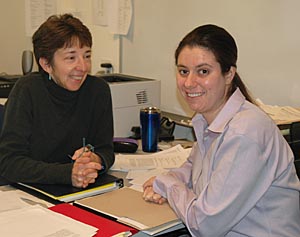Lauren Malone will be heading to Washington, D.C., after earning a Ph.D. in economics this spring.
Malone weighed multiple job offers and recently accepted a position with the Center for Naval Analyses, where she will be doing applied microeconomics and empirical work. "The course of my graduate career has provided me with a great skill set, and one that I want to put to greater use than publishing in academic journals," said Malone.
A fan of microfinance development programs that alleviate poverty by providing tiny grants of $50 and $100 to women in developing countries, Malone had anticipated a career in development-related work--until she spent an intellectually stimulating day this winter at the Center for Naval Analyses, where she will work on issues of labor economics in the context of the Navy and Marine Corps. Likely topics include recruitment and retention, cost-benefit analysis of different types of weaponry acquisitions, as well as evaluations of military health care, retirement, and compensation plans, she said.
Malone's dissertation research has documented how remittances sent by Mexican migrants working in the United States boost the educational opportunities for children in Mexico--especially when mothers at home in Mexico get to decide how the money will be spent.
In her analysis of remittance flows, Malone has discovered significant disparities between the spending priorities of mothers and fathers. Mothers, it turns out, are more inclined to invest those earnings in their children's education, while fathers are more likely to invest in farm or household improvements. In addition, mothers have greater control over household spending when the father is absent, and the longer a father is away from home, the higher the educational attainment of his children, she said.
"These remittance flows are, in fact, being invested in education," said Malone, who earned a B.A. in global economics and Latin American and Latino studies from UCSC in 2003. "That has serious implications for inequality, because one of the best ways to alleviate poverty is to provide people with education. That's how we move people up the income scale."
Malone's model is the first to incorporate asymmetric parental preferences and actual decisions about how remittances are spent. Her work is based on a sophisticated analysis of survey data gathered from more than 17,000 households in Mexico by the Mexican Migration Project.
"Lauren is one of the best," said economics professor Kenneth Kletzer, who helped recruit Malone for the graduate program.
"My interest is international, and UCSC is one of only a few places where you can get a degree in international economics," said Malone, who described the first year of graduate school as "like boot camp." But Malone has done outstanding research and has worked side-by-side with top faculty.
"There is a tremendous support network from faculty," she said. "They really care about their students and are willing to work with them. There's no weeding out. They truly want everyone to succeed." Of economics professor Lori Kletzer, Malone said simply, "I would never be where I am today without her. Literally, her door is always open. We talk at least twice a week."
As an undergraduate, Malone concentrated on economics during her first two years at UCSC, spent her junior year in Santiago, Chile, and wrapped up her course work in Latin American and Latino studies (LALS) by the end of her senior year. She discovered a passion for the Spanish language during high school and now speaks it fluently.
"I came into graduate school knowing what I wanted to do," said Malone.



